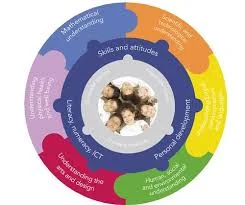Today's topic is How to learn new skills and knowledge for the 21st century? In recent years, 21st-century skills is a very
eye-catching concept of education. So what do you know about skills in the 21st
century? What are the aspects of the skills involved? What is the significance of
the cultivation of students' quality?
In the new century, American politics, business, and education are all talking about a common topic: every child in the United
States needs knowledge and skills in the 21st century to become a qualified
citizen, worker, or leader.
But there is a deep gap between what schools learn and the knowledge and skills needed for life and work in the 21st century. In order to successfully face the increasingly difficult curriculum, career challenges, and global labor competition in the 21st century, the United States needs to reconstruct its basic education system.
But there is a deep gap between what schools learn and the knowledge and skills needed for life and work in the 21st century. In order to successfully face the increasingly difficult curriculum, career challenges, and global labor competition in the 21st century, the United States needs to reconstruct its basic education system.
As a result, a national 21st-century skills
partnership organization has been formed. The participating organizations
include government departments (such as the U.S. Department of Education, as
well as the education authorities of 15 state governments) who have also
decided to put "21 Century skills "has been introduced into the whole
education system), business institutions (including dozens of large companies
such as Microsoft, Cisco, IBM, etc.) have given financial support and
participated in the organization's strategic committee, and the organization
has also attracted a number of non-governmental organizations, including the
American Library Association, and relevant researchers from most universities
in North America to participate in the research work.
Starlight is a new American English comprehensive
textbook launched by Oxford University Press, a world-class publishing house.
It has six levels in total. It cultivates English ability from entry-level to
intermediate level, with reasonable unit structure and clear modules.
Each class follows the learning steps of "participation practice exchange", and takes high-quality learning forms such as songs, stories, projects, and interdisciplinary and cross-cultural courses To train the student's language knowledge and develop the necessary skills in the 21st century.
Each class follows the learning steps of "participation practice exchange", and takes high-quality learning forms such as songs, stories, projects, and interdisciplinary and cross-cultural courses To train the student's language knowledge and develop the necessary skills in the 21st century.
The four most important core skills of the 21st century, let's talk about it!
With the rapid development of the knowledge economy,
globalization and information society, the traditional talent quality structure
with knowledge as the core has become increasingly difficult to meet the needs
of future social development. It is an important trend in the development of
international education to cultivate students 'core skills for the 21st
century.
So what are the core skills of the 21st century?
Different scholars have different definitions.
For example, according to Fernando Reimers of
Harvard University, the core skills of the 21st century include cognitive
skills, self skills, and interpersonal skills.
However, the most convincing is the 2012 OECD
Research Report "improving school leadership for Teachers in the 21st
Century: Experience from the World", which points out that students in the
21st century must master the following four core skills:
1. Thinking mode, that is, creativity, critical
thinking, problem-solving, decision-making, and learning ability;
2. Working style, i.e. communication and
cooperation ability;
3. Working tools, i.e. information technology
and information processing capability;
4. Life skills, that is citizenship, changing
lives and careers, and personal and social responsibility.
Among them, learning and innovation ability is at
the top of the learning skills pyramid in the 21st century, including
creativity and innovation, critical thinking and problem-solving, communication, and collaboration. These capabilities, commonly known as "4Cs", are
regarded as the core tasks of American educational innovation.
Innovation ability
The key to innovative thinking lies in the
originality of ideas and ideas and the persistent attempt. When you have a new
idea, try it. Teachers should constantly encourage students to try in teaching,
even if they fail, let students take failure as a new starting point, and think
about and summarize the experience and lessons, so as to succeed.
Creation and innovation a long processes.
Students in the future must have an open attitude, learn to brainstorm, be
willing to accept and try new and valuable ideas, integrate the new ideas with
the historical and cultural environment around them, be not afraid of failure,
dare to insist, regard every failure as an opportunity to learn, and constantly
accumulate successful experience.
Critical thinking
Critical thinking is not only the thinking of
understanding and analysis but also the thinking of judgment and
decision-making. According to their own experience, American students will
judge which is better, be good at debating, and construct their own views and thoughts,
which is the result of a critical thinking exercise.
Students in the future should learn to use
different reasoning methods such as deduction and induction to analyze
different viewpoints in complex systems and integrate them according to the
actual situation.
Improve your problem-solving and decision-making
ability by constantly raising, analyzing, and solving problems.
In particular, it is worth mentioning that there
should be sufficient evidence and in-depth analysis in raising and solving
problems and the very important prerequisite for the analysis of evidence is
to learn to classify, so the cultivation of classified thinking is an important field for students to learn in the future.
In the process of problem-solving and
decision-making, students should learn to trust, be flexible, and treat others
fairly, which is one of the important preconditions.
In addition, it is also an important prerequisite
to reflect on oneself objectively, just as "self-cultivation" is the premise of "the family, the country, and the world".
Communication skills
The premise of communication is to master good
language knowledge.
In the era of globalization, it is necessary for
future students to master not only their native language but also at least one
foreign language.
But mastering language knowledge is not equal to
having good communication ability. Communication requires students to be
prepared to accept different opinions and listen to different opinions, and to
respond appropriately according to time and place.
Of course, all communication must be built on the
basis of "sincerity". It is a compulsory course for students in the
future to learn how to communicate with others sincerely, confidently, and
openly.
In addition, the ability to communicate is not
only to express and communicate but also to learn to listen. Only listening
can choose and judge, think, and collide.
Teamwork ability
Teamwork requires students to respect different
cultures and perspectives and to express their views clearly and effectively
to team members in a professional manner.
At the same time, teamwork also requires students
to learn how to organize, plan, integrate resources, manage, supervise, and
evaluate effectively around the set goals of the team.
Students should inspire the enthusiasm of each
team member on the basis of integrity and moral behavior, learn to share
the joy of team success, and actively bear the consequences of team failure.
Everybody Up
The new edition of “Everybody Up” links the classroom with the broad external world helping students master skills, build self-confidence, and express their opinions in the real world. Stories, songs, display boards, videos, and other forms of teaching link English with other school courses, as well as universal values, and strive to cultivate global citizens with core skills in the 21st century.
Children in “Everybody Up” will be encouraged to
use 21st-century skills in every class.
Interdisciplinary courses include videos, posters, and related exercises to encourage children to think critically about school
subjects and the world as a whole. (Communication, cooperation, and dialectical
ability)
At the end of every two units, a hands-on
activity will be provided to help them communicate naturally (communication,
cooperation, innovation, dialectical thinking ability) in class or at home.
Each class has oral activities (communication and
cooperation ability) of individuals, pairs, and groups
"Core skills in the 21st century"
emphasizes the evaluation system different from the traditional fragmented
knowledge system, but turns to the cultivation of a deeper, complex, innovative, and cooperative way of thinking and working.
The times are changing too fast. If you want to
be left behind by the times, you have to go one step ahead of the times. Such
excellent teaching materials are still constantly updated.
learning new skills and knowledge
"New knowledge, new methods, new ideas, new
skills"
Through the school-based training and learning, I
benefited a lot and also realized that in education and teaching, we
should renew our ideas, be brave in innovation, and use new knowledge, new
methods, new ideas, and new skills for teaching. This requires us to keep
learning new knowledge.
1. Innovation and development
Only by renewing ideas and building up confidence
can we face up to problems and think about development. Only when we dare to
face reality, face up to the difficulties, strengthen our confidence, and
innovate our development ideas, can we set up the development concept of
"action, position".
Under the condition that the general environment
has not changed, we should constantly increase our self-confidence and pride in
the work of education and teaching, create an atmosphere of entrepreneurship,
and lay a solid ideological foundation for the work of education and teaching.
2. Innovation carrier, creating a bright spot and promoting the development
We should pay attention to learning, keep forging
ahead, and change our ideas. The new curriculum needs new teaching ideas and
methods, which need us to study and change the old and unsuitable teaching
ideas.
Therefore, teachers should keep learning and innovating in order to meet
the needs of new curriculum reform, stimulate students' interest, and cultivate
better students. In teaching, teachers are the main body, and students are the
main body. Traditional teaching is how teachers teach students to learn.
In the
new curriculum reform, it should be a process of interaction between teachers
and students, between students and students. Each class can have different
teaching methods, but no matter what kind of teaching methods are adopted, they
must be conducive to students' learning and reflect their main position.
Students should have independent thinking space, give full play to their
enthusiasm, and encourage to speak boldly so that students will be willing
to learn and accept new knowledge.
3. Moral education and intellectual education
In today's society full of opportunities and
challenges, the talents cultivated by education must be able to adapt to the
trend and requirements of social development. Therefore, it is very important
to cultivate students with both moral and intellectual development.
The new
curriculum reform, it fully embodies the unity and cooperation among students and cultivates the ability to get along with others, fights side by side, and
solve problems.
In a word, in the new curriculum reform, it
should be a new type of classroom that develops through the interaction
between teachers and students. It not only pays attention to the cultivation of
students' emotional experience and ability but also pays attention to the
accumulation of knowledge.
Having learned so much and understood the importance
of the new curriculum reform, we should grasp the new methods in time, change
the old ideas, focus on the development of students, and aim at improving the overall development of students in future teaching work.
*** Please Share These Resources with Colleagues, Friends, and Family ***








